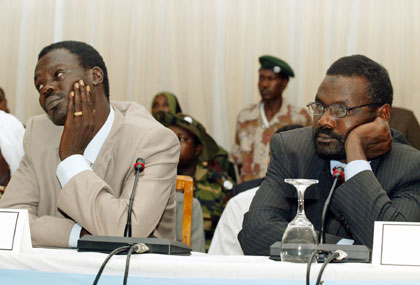ABUJA, Nigeria - Sudan's government and the largest Darfur rebel group agreed
Friday to sign a peace plan, a top U.S. envoy said, marking major progress in an
internationally backed effort to end the death and destruction in western Sudan.

Minni Arcua Minnawi
(L), leader of a faction of the rebel Sudan Liberation Army (SLA) and
Ibrahim Khalil, leader of the Sudanese Justice and Equity Movement (JEM)
participate in a meeting with Sudan government representatives during
negotiations on a peace plan for Darfur in Abuja, Nigeria May 2, 2006.
[Reuters] |
Two smaller rebel groups were still resisting, but U.S. Deputy Secretary of
State Robert Zoellick said acceptance by faction leader Minni Minnawi was key.
"Today the largest group, Minni Minnawi's, has agreed to sign and the
government of Sudan have agreed to sign as well," Zoellick told The Associated
Press. "Not all the movements are in accord, but we're already getting phone
calls that people with (rebel faction leader) Abdel Wahid (Nur) believe he has
made a mistake."
The Nur faction walked out of negotiations in the Nigerian capital before
dawn Friday, as had another rebel group, the Justice and Equality Movement. But
with the government and the Minnawi faction of the Sudanese Liberation Movement
on board, Zoellick was looking ahead to what he said was the next step:
organizing a U.N. peacekeeping force for Darfur.
The Sudanese government initially rejected calls for U.N. peacekeepers to
replace the thousands of African Union peacekeepers in Darfur now, but had
indicated it would yield if a peace treaty was signed. Zoellick said there was
strong backing for a U.N. force among the mediators in Nigeria.
Sudan's government agreed days ago to an initial proposal drafted by African
Union mediators and has been flexible as U.S. and British officials tried to
fine-tune it to address rebel concerns. Members of the fractious rebel camp are
united in accusing the central government of neglecting their impoverished
region, but divided because of leadership rivalries and differing approaches.
"In principle, we, for our part, have agreed to sign" the revised peace
agreement, Minnawi told the Arab satellite station Al-Jazeera Friday. "But there
are many measures that need to be taken to move from principally agreeing to
signing. These include amending some of the proposals and including the brothers
in all the movements."
"I don't know when the signing can take place," he said.
Jaffer Monro, spokesman for the Nur faction, said his group was meeting to
discuss Minnawi's stance. Baba Gana Kingide, the special AU envoy to Sudan, said
he expected the Nur faction to return to negotiations later Friday after walking
out before dawn.
Spokesman Saifaldin Haroun said the Minnawi faction still had concerns about
power sharing, but was no longer insisting Sudan have a vice president from
Darfur. The other factions were believed to have rejected the agreement over
security concerns, because it called for a top presidential adviser from Darfur
instead of a vice president, and other issues.
Envoys from the African Union, the United States, Britain, the European Union
and the Arab League have been pushing for a resolution and talks continued
Friday. Deadlines have been extended twice since Sunday and Thursday's session
went five hours beyond the midnight time limit.
In New York, U.N. Secretary-General Kofi Annan urged all countries to press
the warring parties to reach agreement but warned the international community
has an obligation to protect civilians in Darfur, by force if need be.
He also reminded world leaders that at September's World Summit they had
agreed it was each state's responsibility to protect its citizens, "but where
they fail, or are unable to do so, or they themselves are the perpetrators, the
international community, through the (Security) Council, has to take action,
and, if need by, by force."
The time had come to redeem that pledge in Darfur, Annan said in an interview
on "The NewsHour with Jim Lehrer" on PBS television.
The U.N. Security Council a year ago authorized seizure of assets and a
travel ban on individuals defying peace efforts or violating human rights law in
Darfur. Those sanctions were imposed for the first time last month against a
commander of the Sudanese air force, a Janjaweed militia leader and two rebel
commanders.
At least 180,000 people have been killed and more than 2 million forced to
flee their homes in what the United Nations has called one of the world's worst
humanitarian crisis. The Darfur conflict, which erupted in February 2003, also
has spilled into Chad and Central African Republic. The violence threatens to
escalate: Osama bin Laden last week urged his followers to go to Sudan to fight
a proposed U.N. presence.